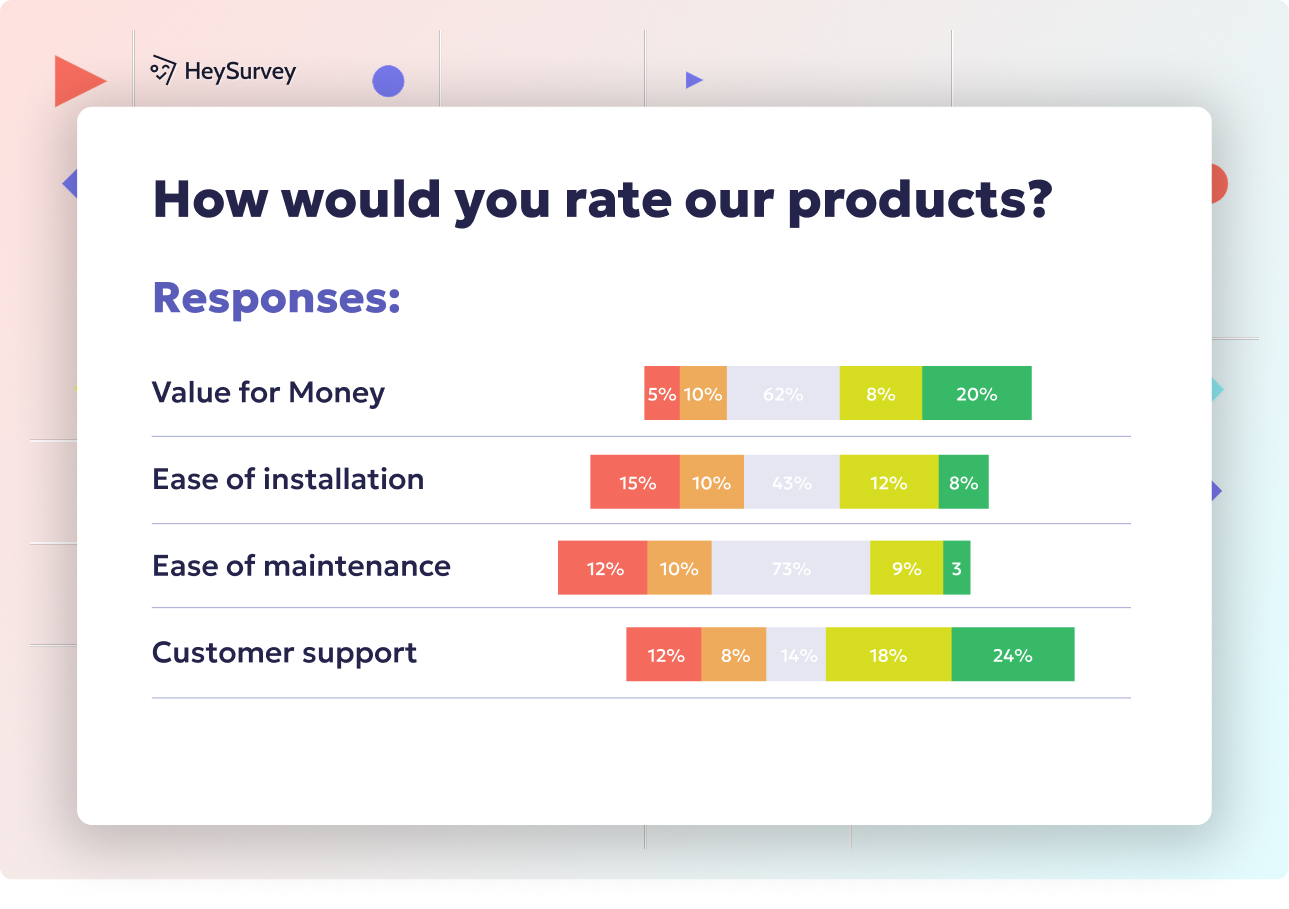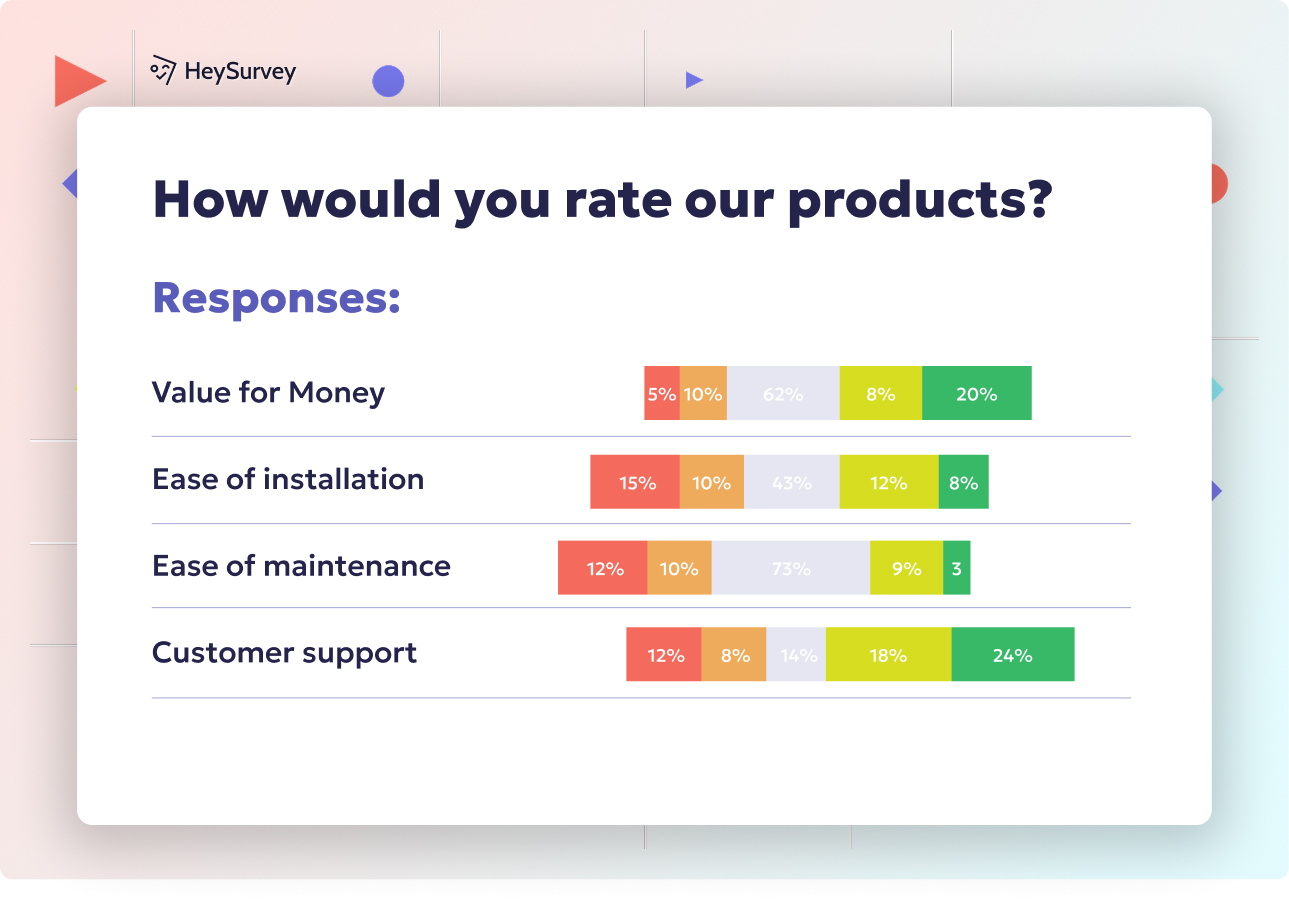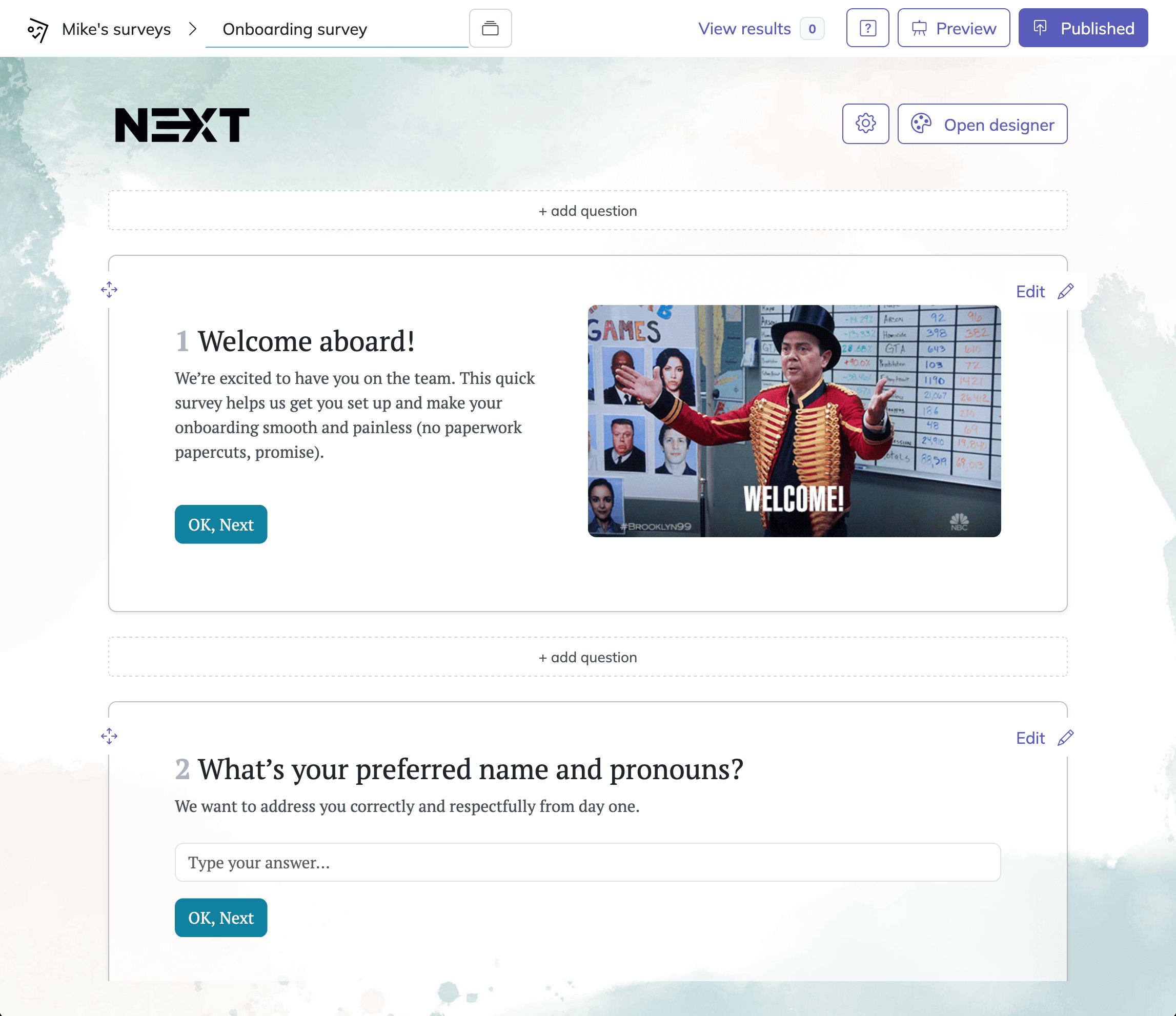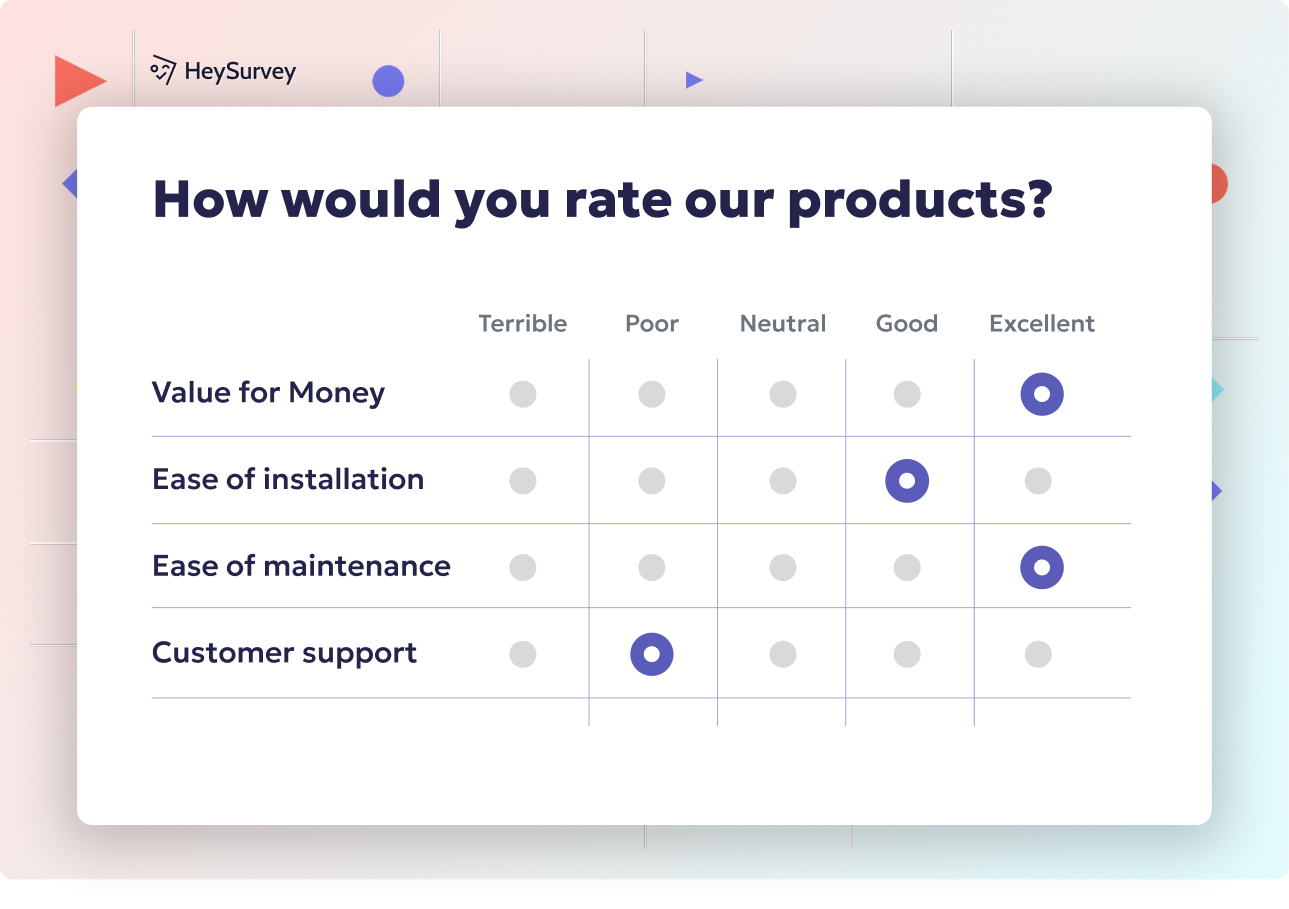30 Team Building Survey Questions: Types, Samples & Best Practices
Discover 28 proven team building survey questions with sample prompts and best practices to improve team dynamics and measure engagement effectively.
Surveys are the secret sauce for improving team dynamics. They spotlight hidden friction, fuel meaningful conversations, and keep engagement from flatlining. The best teams don’t just work together—they check the pulse with regular team building survey questions during moments like onboarding, after project wrap-ups, following reorganizations, or when everyone suddenly works from home. Surveying isn’t a gimmick—it’s how smart companies measure team engagement and make sure every voice counts before things go sideways.
Icebreaker & Get-to-Know-You Surveys
Why & When to Use This Survey
There are few things more awkward than a team of strangers trying to crack a big project. That’s where a team icebreaker survey steps in—breaking the ice, sparking smiles, and accelerating camaraderie. These surveys work wonders whenever a new team forms, during onboarding sprints, or as a jumpstart at the next kick-off retreat.
Seasoned managers know that powerful connections lay the foundation for trust and cooperation. Getting everyone to share a personal tidbit doesn’t just lighten the mood. It paves the way for psychological openness, which is a must before teams dive into heavier culture or process conversations.
Deploy these surveys early or when group chemistry needs a gentle nudge:
- Brand-new teams who barely know names.
- When new hires join and need fast integration.
- Annual or quarterly retreats as a fun reset button.
- Before asking for input on deeper team improvements.
5 Sample Icebreaker Questions
What hobby or talent would you like teammates to know about?
Which communication channel (chat, video, email) do you prefer for quick questions?
What’s one fun fact about your hometown?
Early bird or night owl—when do you feel most productive?
Name a professional skill you’re eager to share or teach the team.
Every “getting to know your coworkers” survey builds bridges that later support vulnerability and candor. When people know a little about each other’s quirks, collaboration becomes genuinely enjoyable, not just a box to tick.
Anonymity in team surveys encourages candid feedback, leading to more accurate insights and fostering a culture of transparency and growth. (culturemonkey.io)

Creating your own team-building survey with HeySurvey is a breeze—even if you’ve never built one before. Just follow these 3 easy steps, then add some bonus touches to make your survey truly shine!
Step 1: Create a New Survey
- Log into HeySurvey (or start without an account to explore).
- Click Create Survey and choose between starting from scratch or picking a relevant pre-built template (perfect for quick kickoff).
- Give your survey a name that helps you spot it later (like “Team Icebreaker Survey” or “Communication Preferences Check”).
Step 2: Add Questions
- Hit Add Question at the top or between existing questions.
- Select question types such as multiple-choice, rating scales, or open text based on your team building survey needs.
- Enter your carefully crafted team building survey questions—remember, a mix of scales and open-ended questions works best!
- Mark questions as required to ensure key insights don’t slip through the cracks.
- Feel free to add images or descriptions to make questions clearer and more engaging.
Step 3: Publish Survey
- Preview your survey with the Preview button to see how it looks on phones, tablets, and desktops.
- When you’re happy, hit Publish.
- Copy the shareable link or embed the survey on your intranet or team chat platform. (Note: You’ll need to create an account to publish and collect responses.)
Bonus Steps to Level Up Your Survey
- Apply Branding: Add your company logo and customize colors and fonts in the Designer Sidebar to give the survey your team’s unique style.
- Define Settings: Set start and end dates, response limits, and a lovely “thank you” redirect URL after the survey is done.
- Skip Into Branches: Use branching to personalize question paths based on answers (great for digging deeper when certain issues pop up).
Ready to jump in? Just click the button below to open your team building survey template and start customizing in HeySurvey right away!
Communication Style & Preferences Surveys
Why & When to Use This Survey
Miscommunication isn’t just annoying—it can derail a project, breed frustration, and make even the best toolkits feel useless. A communication preferences survey is essential before rolling out new collaborative platforms, after adopting more agile workflows, or when misunderstandings seem to multiply like rabbits.
This type of survey is perfect when:
- Teams move to new communication tools (hello, Slack, goodbye, reply-all email!).
- Project delays can be traced to unclear updates or muddled instructions.
- You spot tension over feedback styles or status reporting.
- Cross-functional teams struggle to stay on the same page.
By focusing on how information travels and where it stalls, these surveys offer a roadmap to improving team dynamics—especially when you’re mixing remote and on-site staff or different departments.
5 Sample Communication Questions
On a scale of 1–10, how clear are our current communication channels?
How often do you want team-wide status meetings?
Do you prefer written or verbal feedback?
Which tool (Slack, Teams, email, project board) keeps you most informed?
What’s one change that would improve cross-functional communication?
When everyone’s voice counts, it becomes much easier to craft team building survey questions that eliminate ambiguity and increase team momentum.
Implementing communication style assessments in the workplace enhances team collaboration, leadership effectiveness, and employee engagement by fostering better understanding and adaptation to individual communication preferences. (thomas.co)
Collaboration & Workflow Surveys
Why & When to Use This Survey
Smooth collaboration is every manager’s dream, but it doesn’t happen by accident. A collaboration survey helps debug workflow snags, clarify roles, and bounce back from slowdowns. These are ideal after sprint reviews, midway through big initiatives, or when projects start to feel like quicksand.
Moments that call for these surveys include:
- When task handoffs between teams start to fray.
- If recurring bottlenecks slow down progress.
- After rushed deadlines where roles and responsibility lines blur.
- To check-in before, during, and after key phases of large projects.
With these insights, it’s easier to fine-tune how tasks, resources, and responsibilities flow—resulting in better work and happier teams.
5 Sample Collaboration Questions
How clear are you about your role in our current project?
Do you feel you can easily access the resources you need to work efficiently?
How effective are our handoffs between functions?
Rate our current workload balance across the team.
What’s one bottleneck you’d like leadership to remove?
Strong workflows anchor any effort to measure team engagement, surfacing everything from uneven workloads to ancient coffee machines that just won’t die.
Trust & Psychological Safety Surveys
Why & When to Use This Survey
Innovation doesn’t happen in an atmosphere of fear. Trust and psychological safety surveys are your team’s best defense against stagnation, high turnover, and silent groupthink. When things start to feel brittle—after conflicts, a spike in resignation risk, or when nobody dares offer a wild new idea—it’s time to check the trust temperature.
Deploy these whenever:
- An innovation initiative stalls or fizzles.
- Recent conflicts have left the team wary or withdrawn.
- Turnover increases, and nobody seems to know why.
- After high-stress launches that revealed cracks in trust.
A thoughtful survey reveals what’s going well and, more importantly, what’s unsaid.
5 Sample Trust Questions
I feel safe admitting mistakes to the team—agree or disagree?
How comfortable are you sharing new, untested ideas?
Do you believe teammates assume positive intent?
How well do we celebrate learning from failures?
What one practice would increase trust in the team?
Team building survey questions like these bring vital issues to light and ensure everyone has a say in strengthening the invisible glue holding the team together.
Research indicates that psychological safety is the strongest predictor of team effectiveness, highlighting the importance of trust and open communication within teams. (cultureamp.com)
Leadership & Support Surveys
Why & When to Use This Survey
A great team without strong support from leaders is a bit like a band with nobody on drums. Leadership survey questions clarify if managers are enabling, coaching, and empowering the team—or adding unnecessary noise. Use these after performance reviews, when a new boss steps in, or as part of regular 360-degree feedback.
Ideal timing includes:
- End of performance or annual appraisal cycles.
- Following promotions, manager changes, or reorganizations.
- After introducing new leadership training programs.
- When complaints about direction or recognition surface.
These surveys hold up a mirror to leadership practices, making it easier to pinpoint where to grow.
5 Sample Leadership Questions
My manager provides clear direction and priorities—rate 1–5.
How accessible is leadership when you need support?
Do you receive regular recognition for good work?
How well does leadership remove obstacles?
What’s one action leadership could take to help you succeed?
Actionable team building survey questions like these invite meaningful dialogue about how managers show up for their teams and champion success.
Conflict Resolution & Feedback Surveys
Why & When to Use This Survey
Every team argues—from creative debates to heated disagreements about timelines. But how well do you resolve these sparks? Conflict resolution surveys give insight into how safely team members can disagree, how quickly issues are addressed, and how constructive feedback really is.
Launch these surveys:
- Following major project disputes or tension-filled meetings.
- After organizational changes that shift reporting lines.
- When feedback or conflict avoidance saps momentum.
- To pre-empt brewing issues before they explode.
By normalizing the feedback loop, you lower the temperature and keep innovation lively, never toxic.
5 Sample Conflict-Focused Questions
How safe do you feel raising opposing viewpoints?
How promptly are conflicts addressed on our team?
Do you know the agreed-upon process for conflict resolution?
How constructive is peer-to-peer feedback?
How can we improve our conflict-management approach?
Crafting the right team building survey questions here means issues get solved—not swept under the rug.
Remote & Hybrid Team Engagement Surveys
Why & When to Use This Survey
It’s easy for remote and hybrid teams to drift apart. That’s why remote team engagement surveys are more than just a checkbox—they’re essential for keeping everyone connected, motivated, and in sync across time zones. Use these whenever your team is distributed, right after shifting to a hybrid model, or to periodically check your virtual culture’s pulse.
The best moments:
- Immediately after a shift to remote or hybrid setups.
- When engagement drops or silos start popping up.
- If people report feeling left out due to time zone or tech barriers.
- As a routine quarterly audit of your virtual team health.
Addressing connection and inclusion head-on keeps the virtual coffee breaks and camaraderie alive.
5 Sample Remote-Engagement Questions
Rate our current level of virtual team bonding.
Do you have the technology/tools to collaborate effectively from your location?
How inclusive are meeting times for your time zone?
How often do you feel isolated from the wider team?
What virtual events or practices would help you feel more connected?
When team building survey questions are tailored for remote teams, everyone stays in the loop, no matter where (or when!) they log in.
Best Practices: Dos & Don’ts for Crafting Team-Building Survey Questions
Great surveys are equal parts art and science. Adhering to team survey best practices ensures your questions get honest, actionable responses that spark improvement—not eye-rolls. Here’s how to make that happen:
Dos
- Keep it concise! Surveys should take less than 10 minutes.
- Mix rating scales with open-ended prompts for richer data.
- Guarantee anonymity to foster candor and openness.
- Always close the feedback loop by sharing results and action plans.
Don’ts
- Avoid leading questions that steer people to “safe” answers.
- Never ask double-barreled questions (“Do you feel confident and motivated?” is really two questions in one!).
- Steer clear of collecting personally identifiable information to protect privacy.
Optimal frequency? Pulse-check surveys quarterly, after big changes, or when something feels “off.” Schedule follow-up meetings to dig deeper into insights and track progress using action items tied to OKRs.
Following these essential tips for how to write team building questions helps every team build a culture of transparency and continuous improvement—without overwhelming employees or drowning in data.
Sticking to these survey dos and don’ts pays off: teams feel heard, results drive smarter action, and trust grows survey by survey.
Checking the pulse with thoughtful team building survey questions is the surest way to improve team dynamics for the long haul. Every team and moment offers a fresh opportunity to listen, adapt, and thrive. Use these survey types, sample prompts, and best practices to strengthen engagement and unlock your team’s potential. When in doubt, keep it playful, keep it concise, and above all—keep asking.
Related Employee Survey Surveys

29 Essential Post Mortem Survey Questions for Project Success
Discover 25+ essential post mortem survey questions to improve projects, boost team morale, and d...

31 Change Readiness Survey Questions to Boost Your Success
Discover 25+ sample change readiness survey questions to assess attitudes, barriers, and confiden...

31 Retreat Survey Questions to Collect Actionable Feedback
Discover 26 essential retreat survey questions to gather actionable feedback before, during, and ...
